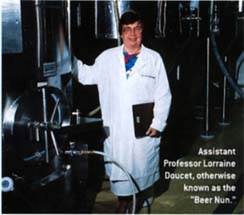 |
 |
| current issue |  | past issues |  | send a letter/news |  | address update |  | advertise |  | about us |  | alumni home |
Campus Currents
|
A Godsend for Microbreweries
By Meg Torbert |
Easy to print version |

|
Monks have been brewing beer and making wine since the Middle Ages, but Lorraine Doucet, a nun with the Sisters of Holy Cross and an assistant professor at UNH-Manchester, had initial reservations about using her expertise in microbiology to help New Hampshire breweries.
F. "Woody" Thornton, a fellow microbiologist who worked at Anheuser-Busch in Merrimack, N.H., helped persuade her. "You have a gift," he said. "You have to share it."
Doucet's "gift" is an in-depth knowledge of the bacteria that plague breweries, pediococci and lactobacilli, as well as a background in food and water sanitation. Her research, summer workshops and advice as a consultant to microbreweries have earned her such renown that sleep-deprived head brewers often call UNH-Manchester, desperately seeking the "Beer Nun."
For microbreweries, a bacterial infestation means tossing out an entire shipment and shutting down the brewery until the source can be eradicated. For small businesses who cannot afford a staff microbiologist, Doucet is a valuable resource. Jon Thomas, head brewer at New Hampshire Custom Brewery, which makes Loon Beer in Manchester, N.H., calls her "manna from heaven." When Loon was getting started two years ago, Doucet helped Thomas grow his first batch of yeast in her lab. She has provided a combination of practical advice and sophisticated laboratory testing ever since.
Doucet "looks at the whole picture--quality, bottles, distribution--everything," says Castle Springs executive vice president Mark Wiggins. In 1996, when Castle Springs started its brewery, Lucknow, in Moultonborough, N.H., Doucet was asked to be a consultant. "She became instantly a member of the team," says Wiggins. "She worked 12-hour days, weekends. And it was all positive energy."
UNH-Manchester students have benefited from "Sister Doctor" Doucet's new mission as well. After Castle Springs' brewery began production, several UNH-Manchester students landed jobs there, with Doucet providing on-the-job training. Next fall, students will be able to enroll in a new UNH-Manchester course, "Brewing and Industrial Microbiology."
Doucet continues to find time for research, including a project to find a medium that will allow faster testing for the presence of bacteria. But assisting microbreweries has become a priority. "These companies are the underdogs in the industry," she says. "If I can help them stay in business, then people will stay employed, and industry stays in New Hampshire."
blog comments powered by Disqus
